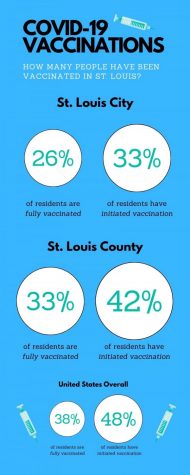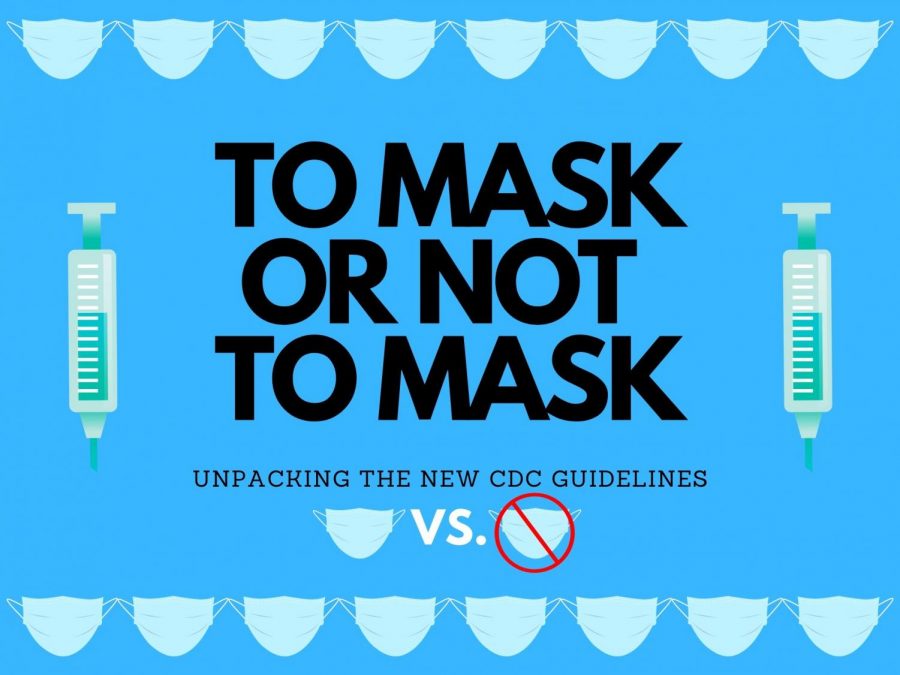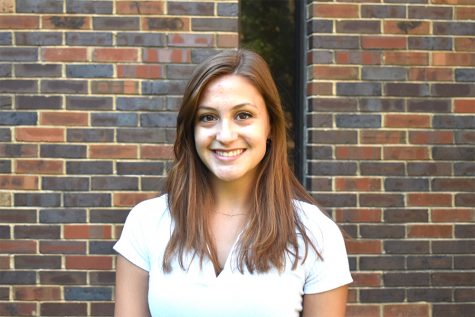After over a year of masks, social distancing and staying at home, many have been looking for reprieve from the constant precautions set in place to keep the pandemic at bay. The Centers for Disease Control and Prevention has finally announced that after all of these efforts, fully vaccinated people no longer have to wear masks. This leaves a lot of us wondering: what now?
With this announcement in mind, according to the CDC, completely vaccinated people may resume activities done prior to the pandemic without wearing a mask or social distancing, as long as they are in accordance with federal, state, local, tribal and territorial laws. Everyone is still required to follow all workplace and business guidelines, which includes school policies. In Parkway, the district will continue its mask and social distancing policies through the remainder of the school year.
ŌĆ£I think our kids have been great, I think everybody has been great. It’s been one of those years where, we know this is weird, we know that you’re being asked to do weird things, but we’re not gonna complain too much because we get that [itŌĆÖs weird], and [that] the science keeps updating,ŌĆØ Principal Jeremy Mitchell said. ŌĆ£Especially recently with the new CDC guidelines, I didn’t know if there was going to be a lot of people complaining, but people were like, ŌĆśOkay, fine. We’ve been doing it all year, [we can do it] for two more weeks.ŌĆÖ I really appreciate the way that students and staff, but students especially [have gone] with it.ŌĆØ

In St. Louis, the city has recommended that while masks will no longer be mandated in most places, as businesses have the right to choose, you should wear a mask if you are in close contact with unvaccinated people. In the country as a whole, you are not required to get tested after travel within the United States, or if you have been in contact with someone who has contracted COVID-19, unless you feel any symptoms.
ŌĆ£I wouldn’t go as far as saying that there’s an end [to wearing masks]. Due to the uniqueness of the ages in our [school], if I were a betting man, I would not even say that I feel strongly that all masks will be gone next year,ŌĆØ Mitchell said. ŌĆ£I have a feeling that next year is going to be pretty normal. We’re going to have school, we’re going to have activities, we’re going to have clubs, we’re gonna have all that stuff. My guess is going to be that weŌĆÖre all going to be masked, or at least we’re going to suggest that [we should all be masked].ŌĆØ
Mitchell does not believe that Parkway will implement a policy in which students would be required to wear masks unless they are vaccinated. As of now, St. Louis remains at around 26% of residents fully vaccinated, with St. Louis CountyŌĆÖs rate hovering at 33.2% of the population. Pfizer recently approved vaccines for everyone ages 12 and up, meaning that a lot more people are able to get the vaccine, including many middle and high school-age children.
ŌĆ£I think weŌĆÖll encourage [people to get vaccinated], and I think we are [encouraging people] by having the district set up dates where you can [get vaccinated]. That being said, I don’t think the district wants to be in a spot where [they are] trying to suggest to families how they should live their life, that’s kind of up to them and I don’t feel like that’s our responsibility,ŌĆØ Mitchell said. ŌĆ£If the vaccinationŌĆÖs out there and we decide not to wear masks, and then somebody gets it who wasnŌĆÖt vaccinated, well you had the option of getting vaccinated.ŌĆØ
While the CDC has approved almost all restrictions on mask-wearing and social distancing to be loosened, the CDC still urges for people, regardless of vaccination status, to wear masks on all forms of public transportation, including buses, trains and planes. And though testing requirements for national travel have been waived in the United States, the CDC still requires a negative test result or some form of COVID-19 recovery documentation before returning to the United States from another country. Now, however, there are no requirements to leave the country. When junior Fatimah Hussain traveled to Pakistan in March, restrictions were tighter.
ŌĆ£Before we left, we had to get tested within a day of our first two days of our flight, and we had to get a negative COVID test and then coming back, we also had to get a negative COVID test within two days of our flight. The airports, internationally especially, were fairly empty and we stayed away from people and wore masks, obviously, and even in Pakistan we didn’t really go many places,ŌĆØ Hussain said. ŌĆ£I did [feel safe about COVID precautions]. Thankfully it went pretty smoothly but there was a worry of us possibly getting stuck there and just problems like that.ŌĆØ
America has faced criticism in the international community for potentially hoarding vaccines, as many countries struggle with vaccine shortages, and surges in coronavirus infections. The CDC currently recommends that international travelers should get tested three to five days after international travel, but do not need to self-quarantine after arriving in the United States.┬Ā
ŌĆ£I mean, I’d like to think [travel could go back to normal] with everyone getting vaccinated. Last year, we went over spring break, and coming back there were a bunch of problems with the potential of us getting stuck there so we had to book so many flights to try and get out because they kept getting canceled,ŌĆØ Hussain said. ŌĆ£So many of my friends are vaccinated and so now I feel like it should be back to normal but it’s hard to say for certain.ŌĆØ
Here in Parkway, the fate of a mask or vaccine requirement for the fall is still up in the air. While schools can require vaccines for diseases like Measles, mumps and rubella, mandating a COVID-19 vaccination includes a lot of gray area. An ultimate decision on masks and vaccination has yet to be made.
ŌĆ£I don’t know if we have control of the bottom line. I think the bottom line is going to be the state of the pandemic. What are things we can do? I can give you all the usual ŌĆśwear your mask,ŌĆÖ ŌĆśsocial distance.ŌĆÖ IŌĆÖll say if everybody gets vaccinated thatŌĆÖs going to help too. I think those things you can do,ŌĆØ Mitchell said. ŌĆ£If you feel like that’s not right for whatever reason, I’m not here to question that, but then that would probably make it a little bit more of a challenge. The bottom line is just hope and pray that this pandemic will begin to shrink, which it seems to be, we seem to be heading that direction, that’s where I’m hopeful.ŌĆØ



![Gazing up from the stage, junior Joseph McCurdy who played Peter Pan in the school play, Lost Girl, sits next to senior Juliana Rogers, who plays Wendy Darling, during a theater rehearsal. McCurdyŌĆÖs passion for theater began when he observed a West High production in middle school. ŌĆ£I've been in the high school theater program since I was a freshman. I've always loved theater, but [what prompted me to join] was [when] I went to see [a performance here] when I was in middle school, and it was super cool,ŌĆØ McCurdy said.](https://pwestpathfinder.com/wp-content/uploads/2025/11/IMG_6535-1200x798.jpeg)

![Standing tall, stacked in a precise formation, the cheer team strikes a signature pose during halftime on Sept. 12 at the varsity football game. Nearly a month after this performance, the cheer team performed at the Missouri Cheerleading Coaches Association (MCCA) regional competition on Oct. 4, 2025. ŌĆ£We've all come [to] work together a lot more,ŌĆØ sophomore Elyssa Philippi said. ŌĆ£We're a lot closer than we were [earlier in the season] and going to state has made us closer [in] trying to work with each other, learn [new] skills and make our team better.ŌĆØ](https://pwestpathfinder.com/wp-content/uploads/2025/11/DSC5139-1.jpg)
![Handing out candy to excited trunk-or-treaters, President of the United Nations ChildrenŌĆÖs Fund club and junior Sara Ashok represents that group. Ashok was eager to participate in this event for multiple reasons. ŌĆ£I really wanted to be a part of the event because I get to help create memories for kids and spend time with my friends, spreading the things [I'm passionate about],ŌĆØ Ashok said.](https://pwestpathfinder.com/wp-content/uploads/2025/11/DSC_8648-1-1200x800.jpg)

![Smiling in a sea of Longhorns, Fox 2 reporter Ty Hawkins joins junior Darren Young during the morning Oct. 3 pep rally. The last time West was featured in this segment was 2011. ŌĆ£[I hope people see this and think] if you come to [Parkway] West, you will have the time of your life because there are so many fun activities to do that make it feel like you belong here. I was surprised so many people attended, but it was a lot of fun,ŌĆØ Young said.](https://pwestpathfinder.com/wp-content/uploads/2025/10/Edited2-1200x798.jpg)
![West High seniors and families listen as a representative of The Scholarship Foundation of St. Louis, Teresa Steinkamp, leads a Free Application for Federal Student Aid (FAFSA) workshop. This session, held in the library, provided guidance on financial aid, scholarships and student loan options. ŌĆ£This event is very beneficial for any seniors who are applying to or considering applying to colleges after high school [because] the cost of college is on the rise for seniors and parents,ŌĆØ college and career counselor Chris Lorenz said.](https://pwestpathfinder.com/wp-content/uploads/2025/09/DSC_4478-1200x778.jpg)
![Senior Kamori Berry walks across the field during halftime at the Homecoming football game on Sept. 12. During the pep assembly earlier that day, she was pronounced Homecoming Queen. ŌĆ£I thought it was nice that the crowd [started] cheering right away. I know [my friends] were really excited for me, and my family was happy because typically non-white people don't win,ŌĆØ Berry said.](https://pwestpathfinder.com/wp-content/uploads/2025/09/DSC7046-Enhanced-NR-1200x798.jpg)


